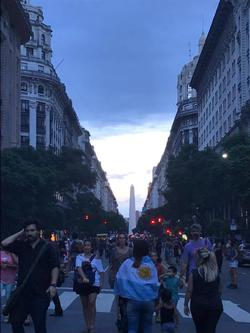Features
Where in the World is Sabrina Gattine '18
By Sabrina Gattine ’18
April 13, 2017
Tags features
¡Hola!
Writing to you from Tucumán, Argentina, where I’m wrapping up a week-long visit of provincial health programs in this area. My program is focused on studying public health in urban environments in Buenos Aires, Mendoza and Tucumán. The majority of our semester is spent in Buenos Aires, which is definitely an adjustment from the Historic Village of Clinton. Here’s a crash course in porteño culture: #1. If you’re not drinking mate, you’re doing it wrong. It’s a loose-leaf tea that has more antioxidants and energizing properties than coffee or green tea. You drink mate out of a hollowed out gourd, which is also called a mate, with a straw that filters out the leaves. 10/10 would recommend. #2. Shaking hands isn’t really a thing here. Something that definitely took me by surprise during the first week here was the custom of kissing on the cheek to say hello or goodbye, regardless of if you know the person or not. If someone goes in for a cheek kiss and you dodge and stick out your hand, it signifies that you don’t want to be close to that person or you don’t trust them. #3. Dulce. De. Leche. Instead of an obsession with peanut butter or chocolate, porteños have dulce de leche. It’s kind of like caramel, emphasis on kind of. Some people eat solid bars of dulce de leche or put it on their toast in the morning, but I happen to be a big fan of alfajores.
While we’re in Buenos Aires, we take Spanish classes at the University of Buenos Aires and take classes specific to public health at Universidad ISALUD. During the semester we have two visits to different provinces to visit health centers and hospitals of differing complexity and specialization. We’ve had the opportunity to sit in on doctor’s appointments, tour hospitals, see cadavers and evaluate the condition of patients admitted into the ER.
One of my favorite experiences so far has been visiting a rural school to teach the students how to properly wash their hands and brush their teeth. To show how germs spread, we put glitter glue in each of the kids’ hands and then had everyone shake hands and give each other high fives. By the end of the lesson everyone was covered in different colors of glitter. We brought all of the kids soap, combs, hand towels and toothbrushes, and they were so excited. All of the boys ran into the bathroom to fix their hair and the girls sang songs with us while we washed our hands. When we were not touring health centers, we visited bodegas, food festivals, tango shows, famous landmarks and the foothills of the Andes.
At the end of the semester we have to complete a month long independent research project about a public health issue that we’re interested in. We have the opportunity to conduct interviews and observations with health experts in the field and location of our choice. I’m currently planning to investigate treatment programs for pregnant women and their babies who are addicted to drugs. Through this work, I hope to assess the needs of the community and effectiveness of the programs that are already in place.
It has been interesting to compare the United States to Argentina, which has universal health care. There are obviously advantages and challenges to every system, but it’s a huge success to have the framework to be able to provide health care to everyone who needs it. The universal health care system is only one of the great things that this country has to offer. If you have the chance, definitely make a trip to Argentina!





